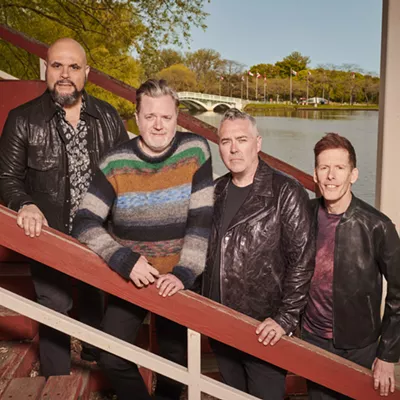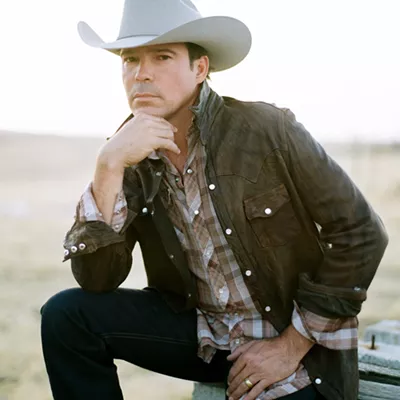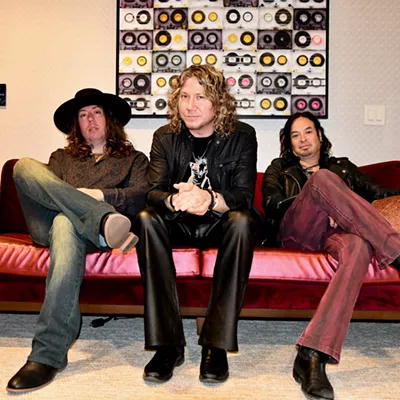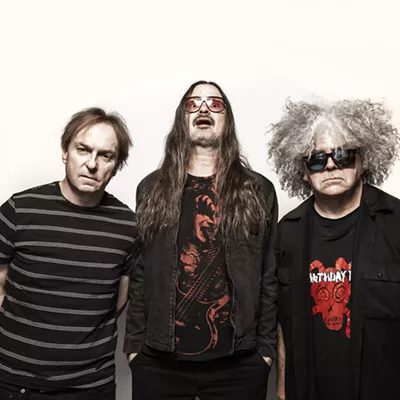Alan Anderson's long road to releasing his debut record as a singer, songwriter and bandleader began nearly two decades ago, his first songwriting efforts emerging as his way of working through some tough times.
A longtime drummer with some of Tucson's best bands—including Greyhound Soul, Rich Hopkins' Luminarios and the Wyatts—Anderson stepped out from behind his kit and started writing his own songs to push past some pain and chaos.
"I was going through a little bit of turmoil in my life and I needed something else to feel good about. I believed in music, like music was church for me," Anderson says. "I felt that if I could start creating my own entity, my own identity, then I would feel better about myself, that I would have something to believe in."
Music had been there for Anderson since high school drum line. He studied with the renowned drummer Fred Hayes for 10 years. "In the beginning I was more of a metalhead and into progressive rock. He taught me everything and anything under the sun, and my interests were everything and anything."
Anderson began playing in local bands seriously in the early 1990s, joining with the progressive band Shock Hilary before shifting gears to play with Greyhound Soul in 1993.
"I devoted all my time to Greyhound Soul in the beginning. It was hard not to because we were playing sometimes three times a week and doing four-day weekend tours out to California and Phoenix," Anderson says.
Playing in Greyhound Soul brought Anderson out on the road, to SXSW and on European tours, where the rock 'n' roll lifestyle was in full effect.
"Getting out of Greyhound Soul was a situation that, with music comes drugs. My life with that spun a little bit out of control," he says. "I was trying to find my way through music and it seemed like music was my saving grace all the time."
Anderson continued playing drums after leaving Greyhound Soul, joining Funky Bonz. But it was around that time, in the mid-1990s, that he began devoting time to slowly working out some of his own songs.
"My only knowledge of any type of melodic instruction was the piano in high school. I'd always had a voice but I never used it. I just wanted to be a drummer at the time," he says. "I finally realized after being in Greyhound Soul and Funky Bonz and all this other stuff, that I had more than just a drumming talent. It just took me a while to build up the confidence. I took what I learned in piano and music composition from Pima and I just started writing. Everything that I was going through at the time, all that chaos in my life, that ended up in the songs."
Anderson started spending time with Craig Schumacher and Nick Luca in Wavelab Studio.
"Craig is always about putting ideas down in the studio. If it's not polished, he doesn't care. He wants you to go with it. He helped me to be creative from the get-go. A lot of it was putting down a beat and going home to the piano and saying, 'How is this beat speaking to me?'" Anderson says. "I'd always been a musical thinker, with music stuff rambling in my head. This is when I was able to put it all together."
Still, money and motivation weren't always there, and the rock 'n' roll was still threatening to take over, so Anderson left his songs alone for a while.
"It wasn't until I started getting my life together that I formed my own band," he says.
Anderson started the Jits in 2009, putting together a band of his own for the first time to work out those songs that had been building up over the years. His wife came up with the name.
"The idea behind it was when soldiers in World War II were in combat or in their downtime, they would get this feeling that it was their last day on Earth, like this strong premonition that they were going to die, and they called it 'getting a case of the jits.' They'd say 'Maybe it's my last day on Earth, but I'm going to live it my best," he says.
The Jits began solidifying when Anderson brought in Doug Floyd on guitar and Loren Wessel on bass. Most of the time, the Jits include three guitarists, two drummers and a bass player, with a variable lineup that brings in a variety of skills and experiences on any given night.
"The Jits have always been a non-genre-specific band. The Weekly described us as that a long time ago and I dig that. I don't limit myself to saying we're a particular type of band. I've always completely refused to be labeled as one style. If you have it in you, fucking use it. There's no point in having people decide for you who you are," Anderson says. "We can play any place, any time and please anybody. We can do covers; we can do originals. If you want slow, we can do slow. We can do upbeat, anything you want.
"I've got enough members, a revolving door of musicians, that if a bar wants to book a show, I never have to say no. Their styles are so different, but yet they all work," he says.
The lineup now features Anderson, Floyd, Wessel, Damon Barnaby and Loren Dirks on guitar, Rob Lauver on drums and Amy Mendoza on bass.
Anderson turned up the focus on his debut record after the band jelled, but pieces of the record span his entire songwriting life. And about 20 musicians show up at one time or another on the recordings.
"We're talking about my very earliest ideas, the very beginning of time for me writing music. Then you jump to current songs, which are just a few years old," Anderson says. "To me they feel brand-new because it's a whole new life revived into me with these new songs. Before, I was going in the studio because that's the only place I was enjoying who Alan was, the only place I felt confident doing anything. Now I don't have those issues anymore. Now I don't have to write about the pain anymore. Now I have the best of both worlds. My life is great and I get to do music.
"It's all that hard work, all that pain, all that blood, all that sweat," Anderson says. "Everything I've experienced in my life in the last 20 years is on this album. That's why I called it Jittersweet."












